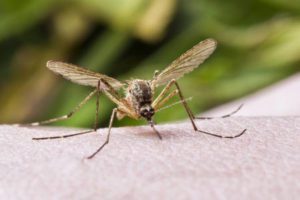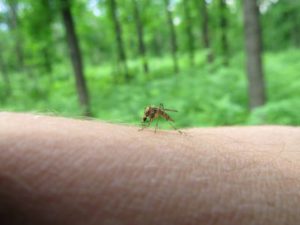UH OH! REPELLENTS MAY BE LESS EFFECTIVE AGAINST INFECTED MOSQUITOES
By Chris Williams on December 30, 2019.
Already starting to think about spring and warm weather…and perhaps the bugs that warm weather brings? Well, we are. These days, public health pests such as ticks, bed bugs, and mosquitoes are more important than ever. If you’ve been reading this blog, you know that new diseases transmitted by blood-sucking pests, especially ticks and mosquitoes, are frequently in the news.
BUT WE’VE ALWAYS RELIED ON INSECT REPELLENTS!
 As a result, we’re always touting the importance of prevention of bites since that’s how infected ticks and mosquitoes transmit diseases to people. Personal repellents, usually in the form of a skin or clothing spray, are a main defense, especially against mosquitoes. But that approach may not be as effective as we expected.
As a result, we’re always touting the importance of prevention of bites since that’s how infected ticks and mosquitoes transmit diseases to people. Personal repellents, usually in the form of a skin or clothing spray, are a main defense, especially against mosquitoes. But that approach may not be as effective as we expected.
As a class project, University of South Florida Associate Professor Marc Lajeunesse and his entomology students conducted a data research study asking the question, “Do infected and non-infected mosquitoes show different responses to insect repellents?” The average individual would ponder this for a moment and conclude that no, there’s no reason why a repellent should work differently if a mosquito just happens to be carrying a disease. But it seems that average individual might be wrong.
Rather than conducting original field studies, the students screened 2,316 existing research studies and identified 13 of those that had data that could be used for their meta-analysis. They looked at seven different repellents, six different mosquito species, and various infectious agents transmitted by mosquitoes including malaria, dengue, and Zika virus.
SHOULD REPELLENT RESEARCH BE REDIRECTED?
Overall, the pooled data showed that most disease-infected mosquitoes were less responsive to repellents that uninfected mosquitoes. A secondary finding was that older mosquitoes were less sensitive to repellents than younger mosquitoes.
 It’s certainly worrisome if the infected mosquitoes that need to be repelled the most may be repelled the least. One suggestion from the study is that future tests of repellents should be made with infected mosquitoes, as well, since they are clearly the most important target. Much more research is needed to confirm these results and answer various questions such as “exactly how does being infected reduce a mosquito’s response to chemical repellents?”
It’s certainly worrisome if the infected mosquitoes that need to be repelled the most may be repelled the least. One suggestion from the study is that future tests of repellents should be made with infected mosquitoes, as well, since they are clearly the most important target. Much more research is needed to confirm these results and answer various questions such as “exactly how does being infected reduce a mosquito’s response to chemical repellents?”
This study doesn’t suggest that you should forgo mosquito or tick repellents or that they don’t work. They remain your best protection against these blood-sucking insects. For more on the use of repellents, take a look at these Colonial blogs:
- Mosquito Repellents Tested and Rated
- What’s the Best Insect Repellent?
- Most of Us Don’t Buy or Use Insect Repellent
- Do Insect Repellents Work Against Ticks?
As a reward for their good work, each of the 36 undergraduate students involved was listed as a co-author on the scientific paper published in the Journal of Medical Entomology, November 22, 2019.